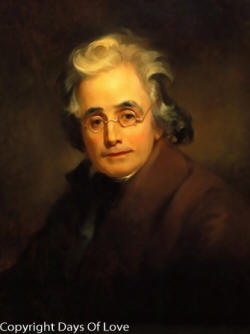

Queer Places:
Mount Vernon Cemetery, 3499 W Lehigh Ave, Philadelphia, PA 19132, Stati Uniti
 Peter
Stephen Du Ponceau (born Pierre-Étienne du Ponceau, June 3, 1760 – April 1,
1844) was a French-American linguist, philosopher, and jurist. After
emigrating to the colonies in 1777, he served in the American Revolutionary
War. Afterward, he settled in Philadelphia, where he lived the remainder of
his years. He contributed significantly to work on the indigenous languages of
the Americas, as well as advancing the understanding of written Chinese.
Peter
Stephen Du Ponceau (born Pierre-Étienne du Ponceau, June 3, 1760 – April 1,
1844) was a French-American linguist, philosopher, and jurist. After
emigrating to the colonies in 1777, he served in the American Revolutionary
War. Afterward, he settled in Philadelphia, where he lived the remainder of
his years. He contributed significantly to work on the indigenous languages of
the Americas, as well as advancing the understanding of written Chinese.
Du Ponceau's fondness for languages began at age six.[1] He studied at a Benedictine college until he abruptly ended his education after only 18 months over a dissatisfaction with the scholarly philosophy taught there. He emigrated to America in 1777, at age 17, with Friedrich Wilhelm von Steuben, Baron von Steuben, who was 30 years his senior.
Du Ponceau served as a secretary to Steuben in the Continental Army during the American Revolution. After the war, he settled in Philadelphia, where he would spend the rest of his life. Among his acquaintances were many important figures of the American Revolution, including Alexander Hamilton, John Laurens, Lafayette and James Monroe.[1]
Du Ponceau joined the American Philosophical Society in 1791 and later served as its president, from 1827 until his death. He became notable in the field of linguistics for his analysis of Indigenous languages of the Americas; as a member of the society's Historical and Literary Committee, he helped build a collection of texts that described and recorded the native languages of the Americas. His book concerning their grammatical systems (Mémoire sur le systeme grammatical des langues de quelques nations Indiennes de l'Amérique du Nord) won the Volney Prize of the French Institute in 1835. In 1816 he was elected a member of the American Antiquarian Society,[2] and he was elected a Fellow of the American Academy of Arts and Sciences in 1820.[3]
Du Ponceau also worked on Asian languages. He was one of the first Western linguists to reject axiomatic classification of Chinese writing as ideographic.[4]
He used the example of Vietnamese (called "Cochinchinese" at the time) using chữ Nôm, a modified form of Chinese characters, showing that the Vietnamese used the Chinese characters to represent sound and not meaning. One hundred years later, his theory remained a source of controversy.[6][7]
My published books: